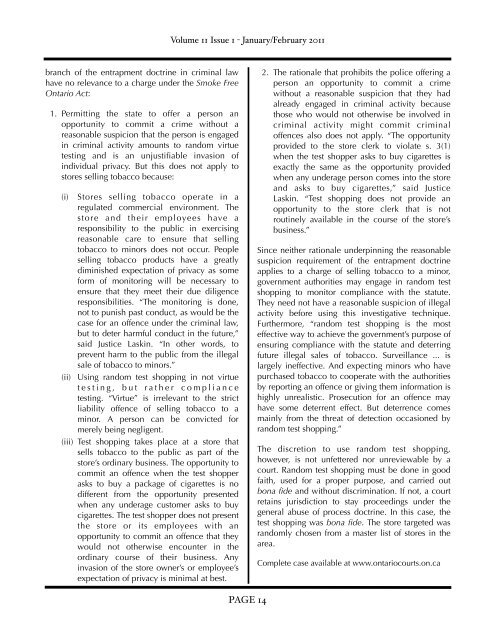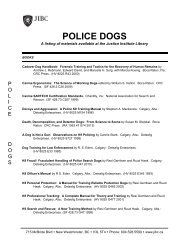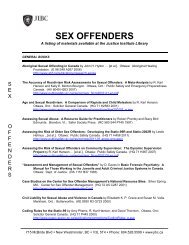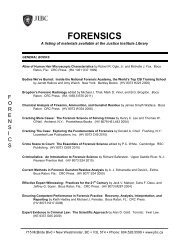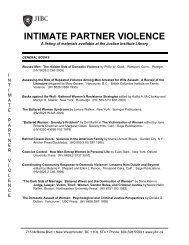legally speaking - Justice Institute of British Columbia
legally speaking - Justice Institute of British Columbia
legally speaking - Justice Institute of British Columbia
Create successful ePaper yourself
Turn your PDF publications into a flip-book with our unique Google optimized e-Paper software.
anch <strong>of</strong> the entrapment doctrine in criminal law<br />
have no relevance to a charge under the Smoke Free<br />
Ontario Act:<br />
1. Permitting the state to <strong>of</strong>fer a person an<br />
opportunity to commit a crime without a<br />
reasonable suspicion that the person is engaged<br />
in criminal activity amounts to random virtue<br />
testing and is an unjustifiable invasion <strong>of</strong><br />
individual privacy. But this does not apply to<br />
stores selling tobacco because:<br />
(i) Stores selling tobacco operate in a<br />
regulated commercial environment. The<br />
store and their employees have a<br />
responsibility to the public in exercising<br />
reasonable care to ensure that selling<br />
tobacco to minors does not occur. People<br />
selling tobacco products have a greatly<br />
diminished expectation <strong>of</strong> privacy as some<br />
form <strong>of</strong> monitoring will be necessary to<br />
ensure that they meet their due diligence<br />
responsibilities. “The monitoring is done,<br />
not to punish past conduct, as would be the<br />
case for an <strong>of</strong>fence under the criminal law,<br />
but to deter harmful conduct in the future,”<br />
said <strong>Justice</strong> Laskin. “In other words, to<br />
prevent harm to the public from the illegal<br />
sale <strong>of</strong> tobacco to minors.”<br />
(ii) Using random test shopping in not virtue<br />
t e s t i n g , b u t r a t h e r c o m p l i a n c e<br />
testing. “Virtue” is irrelevant to the strict<br />
liability <strong>of</strong>fence <strong>of</strong> selling tobacco to a<br />
minor. A person can be convicted for<br />
merely being negligent.<br />
(iii) Test shopping takes place at a store that<br />
sells tobacco to the public as part <strong>of</strong> the<br />
store’s ordinary business. The opportunity to<br />
commit an <strong>of</strong>fence when the test shopper<br />
asks to buy a package <strong>of</strong> cigarettes is no<br />
different from the opportunity presented<br />
when any underage customer asks to buy<br />
cigarettes. The test shopper does not present<br />
the store or its employees with an<br />
opportunity to commit an <strong>of</strong>fence that they<br />
would not otherwise encounter in the<br />
ordinary course <strong>of</strong> their business. Any<br />
invasion <strong>of</strong> the store owner’s or employee’s<br />
expectation <strong>of</strong> privacy is minimal at best.<br />
Volume 11 Issue 1 - January/February 2011<br />
PAGE 14<br />
2. The rationale that prohibits the police <strong>of</strong>fering a<br />
person an opportunity to commit a crime<br />
without a reasonable suspicion that they had<br />
already engaged in criminal activity because<br />
those who would not otherwise be involved in<br />
criminal activity might commit criminal<br />
<strong>of</strong>fences also does not apply. “The opportunity<br />
provided to the store clerk to violate s. 3(1)<br />
when the test shopper asks to buy cigarettes is<br />
exactly the same as the opportunity provided<br />
when any underage person comes into the store<br />
and asks to buy cigarettes,” said <strong>Justice</strong><br />
Laskin. “Test shopping does not provide an<br />
opportunity to the store clerk that is not<br />
routinely available in the course <strong>of</strong> the store’s<br />
business.”<br />
Since neither rationale underpinning the reasonable<br />
suspicion requirement <strong>of</strong> the entrapment doctrine<br />
applies to a charge <strong>of</strong> selling tobacco to a minor,<br />
government authorities may engage in random test<br />
shopping to monitor compliance with the statute.<br />
They need not have a reasonable suspicion <strong>of</strong> illegal<br />
activity before using this investigative technique.<br />
Furthermore, “random test shopping is the most<br />
effective way to achieve the government’s purpose <strong>of</strong><br />
ensuring compliance with the statute and deterring<br />
future illegal sales <strong>of</strong> tobacco. Surveillance ... is<br />
largely ineffective. And expecting minors who have<br />
purchased tobacco to cooperate with the authorities<br />
by reporting an <strong>of</strong>fence or giving them information is<br />
highly unrealistic. Prosecution for an <strong>of</strong>fence may<br />
have some deterrent effect. But deterrence comes<br />
mainly from the threat <strong>of</strong> detection occasioned by<br />
random test shopping.”<br />
The discretion to use random test shopping,<br />
however, is not unfettered nor unreviewable by a<br />
court. Random test shopping must be done in good<br />
faith, used for a proper purpose, and carried out<br />
bona fide and without discrimination. If not, a court<br />
retains jurisdiction to stay proceedings under the<br />
general abuse <strong>of</strong> process doctrine. In this case, the<br />
test shopping was bona fide. The store targeted was<br />
randomly chosen from a master list <strong>of</strong> stores in the<br />
area.<br />
Complete case available at www.ontariocourts.on.ca


